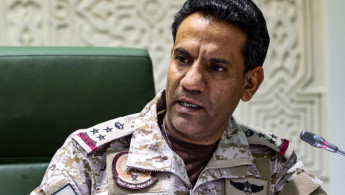Saudi-led coalition accused of using Iraq war footage as 'evidence' of Houthi ballistic missiles in Yemen
The Saudi-led coalition in Yemen used footage from a US documentary about the 2003 invasion of Iraq to accuse Houthi rebels of developing ballistic missiles, according to local media.
Colonel Turki Al-Maliki, a Saudi spokesperson, unveiled at a press conference Saturday "irrefutable evidence" of Houthi missiles in a factory at Hodeidah, reported Daily Yemen.
However, it was claimed that the clip was taken from the 2009 documentary "Severe Clear", featuring videos taken by US Marine Mike Scotti at the beginning of Iraq’s invasion by western forces.
"When the coalition of aggression resorts to cutting out a scene from an American documentary filmed in 2003 during the invasion of Iraq, and says that the scene is from…the port of Hodeidah, it does not mean anything but a peak in bankruptcy," Yemeni journalist Zakaria Sharabi wrote on social media Sunday.
#SaudiArabia #Yemen :Journalist in Yemen @zakaria_sharabi for Daily Yemen points out that footage used by #Saudi coalition spokesman as proof of major weapons store of #Houthis in #Hodeidah seems to come from documentary on #US invasion of #Iraq #ٱلْيَمَن pic.twitter.com/oZP0g9a9ov
— sebastian usher (@sebusher) January 9, 2022
The original footage, shot in Baghdad around April 2003, shows two large missiles, with an American voice saying: "So much for him [presumably Saddam Hussein] not having weapons."
It then sweeps to the other side of the room to show US soldiers.
It is believed that the Saudi coalition used the footage to justify the bombing of a port in Hodeidah, a strategically important maritime city that has been the site of intense fighting between coalition forces and Houthi rebels.
Yahya Saree, a spokesperson for the Houthis, accused the Saudi coalition of "scandal" and "deception" over the footage via Twitter on Sunday.
The war in Yemen has raged on for seven years, resulting in around 377,000 deaths and spawning one of the world’s worst humanitarian crises according to the UN.
Although Saudi officials expected the conflict to last a matter of weeks, the Houthi rebels continue to control key areas in the north and west and there is little hope for an imminent end to the fighting.





 Follow the Middle East's top stories in English at The New Arab on Google News
Follow the Middle East's top stories in English at The New Arab on Google News
![The UAE is widely suspected of arming the RSF militia [Getty]](/sites/default/files/styles/image_330x185/public/2024-11/GettyImages-472529908.jpg?h=69f2b9d0&itok=Yauw3YTG)
![Netanyahu furiously denounced the ICC [Getty]](/sites/default/files/styles/image_330x185/public/2024-11/GettyImages-2169352575.jpg?h=199d8c1f&itok=-vRiruf5)
![Both Hamas and the Palestinian Authority welcomed the ICC arrest warrants [Getty]](/sites/default/files/styles/image_330x185/public/2024-11/GettyImages-2178351173.jpg?h=199d8c1f&itok=TV858iVg)